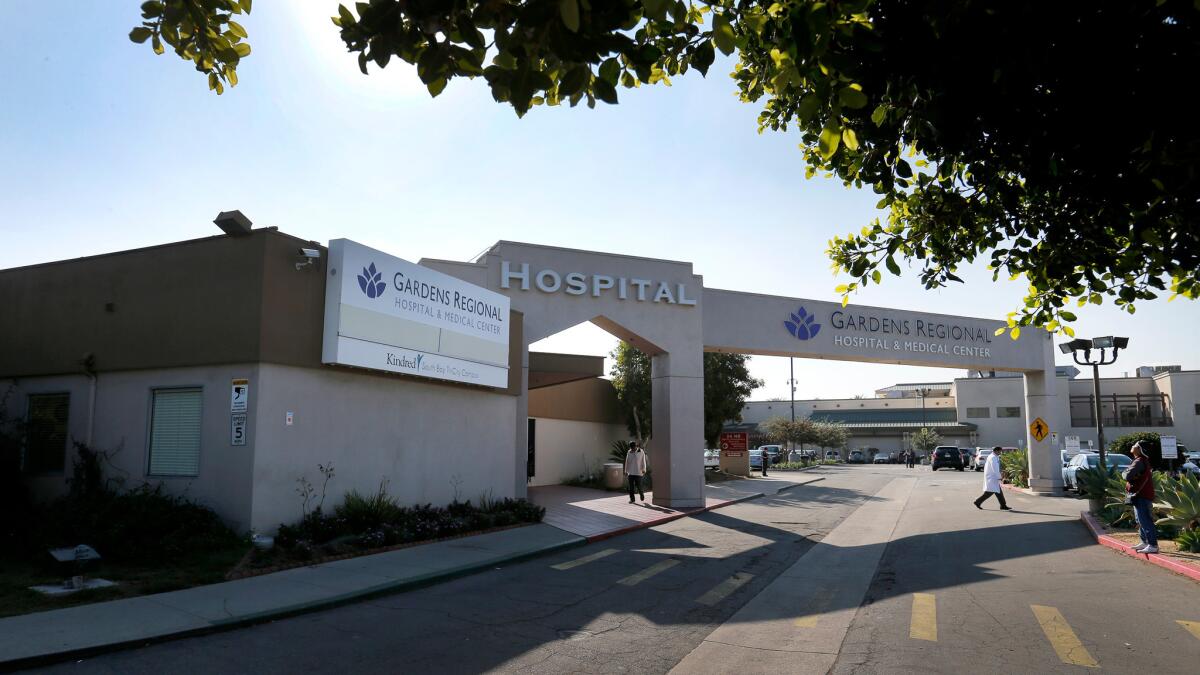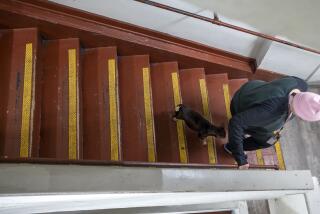Hospital agrees to pay $450,000 to L.A. to settle homeless patient dumping lawsuit

Two years after it dumped a homeless woman on skid row with no identification and wearing only paper pajamas, a Hawaiian Gardens hospital has agreed to pay $450,000 to settle a lawsuit filed by Los Angeles, the city attorney’s office announced.
City Atty. Mike Feuer sued Gardens Regional Hospital & Medical Center last year after the woman, identified in the suit as Jane Roe to protect her privacy, was dropped off by a hospital van in 2014. She was found wandering the streets and eventually ended up in front of Union Rescue Mission.
The suit accused Gardens Regional of repeatedly dumping patients, including this woman, without appropriate treatment or discharge plans. In the last three years, Feuer has filed similar lawsuits against several other hospitals and reached settlements in six of them, netting $3 million in fines and penalties.
Gardens Regional did not have to admit wrongdoing as part of its settlement, Feuer said.
“We’re here again and again and again focusing on this issue because this is not only a matter of some law being violated in the abstract; this is a matter of focusing on the most vulnerable people in our community,” Feuer said at a news conference announcing the settlement Monday. “No one should be treated the way we’ve alleged this person has been treated.”
In a terse reply to Feuer’s announcement, the chairman of the hospital board, Brian Walton, emphasized that the facility admitted no wrongdoing and said he believed “that the care provided to the patient in question was consistent with the applicable standard of care required in these circumstances.”
“This is the last public statement that the Hospital or I will have on this matter,” the statement continued. “The homelessness issues in our County are real. We will not solve them by inaccurate press releases, nor political grandstanding, nor by playing ‘gotcha’ with hospitals. We look forward with some hope to real and constructive government action to actually address the real issues.”
According to the suit, the woman had been admitted to Gardens’ emergency room five times before the dumping incident for depression, hearing voices, amphetamine and alcohol abuse, and uncontrolled diabetes.
Her sister worked at Gardens, the suit said. Before one of her hospital visits, the sister had reported her missing to Monterey Park police. But the lawsuit claims that Gardens failed to check its missing persons’ alert system or notify the family.
Her status was listed as “homeless,” but she often was discharged to “home” and allowed to walk out the door, the suit says. At one point, she was released with only a piece of paper printed with a definition of schizophrenia and an 800 number.
Since the lawsuit was filed, Gardens Regional has filed for bankruptcy and is in the midst of being purchased by another company, city officials said. The $450,000 in penalties will have to be approved by a court before it’s awarded. Feuer’s office also is requesting that the company that buys Gardens Regional adopt Los Angeles’ protocol for releasing homeless, mentally ill patients. The protocol includes coordinating with an outside agency to receive a patient once he or she is released, Feuer said.
In one of the most significant recent cases, Adventist Health, which runs 19 hospitals and clinics in four states, including Glendale Adventist Medical Center, paid $700,000 in 2014 to settle dumping allegations without admitting wrongdoing.
Some hospitals maintain they are hamstrung by laws that prevent them from confining all but the most severely psychotic homeless people. State law requires discharge planning, but hospitals say there is nowhere for homeless patients to go — especially those with mental conditions.
Feuer said that many area hospitals have signed on to appropriate protocols and that his office is investigating other facilities for patient dumping.
The homeless woman at the center of the Gardens Regional settlement had medical insurance and a primary care provider. Gardens also received federal funding for treating homeless people, the suit said.
“This is not charity work,” Feuer said when he first announced the lawsuit. “They are being compensated for this service.”
Times staff writer Gale Holland contributed to this report.
ALSO
Mother, grandfather arrested after death of 2-year-old girl
Frank Gehry’s towering Sunset Strip project faces a fight from two cities
The controversial DNA search that helped nab the ‘Grim Sleeper’ is winning over skeptics
UPDATES:
12:45 p.m.: This article was updated with a statement from the hospital board’s chairman.
This article was originally published at 12:15 p.m.
More to Read
Sign up for Essential California
The most important California stories and recommendations in your inbox every morning.
You may occasionally receive promotional content from the Los Angeles Times.











